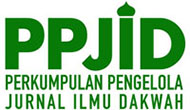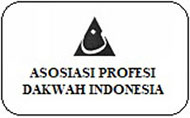Da'wah for Social Justice: Creating Awareness of Social Issues Through a Religious Approach
Abstract
Keywords
Full Text:
PDFReferences
Abdullah, M. R. T. L., Al-Amin, M. N., Ur-Rahman, A., Baharuddin, A., & Ahmad, Z. (2017). Sustainable socio-religious harmony development in Malaysia: an interpretive structural modelling for multi-religious society. Journal of Al-Tamaddun, 12(1), 53–64. https://doi.org/10.22452/JAT.vol12no1.4
Affandi, Y., Riyadi, A., Taufiq, I., Kasdi, A., Farida, U., Karim, A., & Mufid, A. (2022). Da’wah Qur’aniyah Based on Environmental Conversation: Revitalizing Spiritual Capital Ecotheology, Environmentally Friendly, Gender Responsive. Pertanika Journal of Social Sciences & Humanities, 30(1), 159–170. https://doi.org/10.47836/pjssh.30.1.09
Alam, L. (2016). Internalisasi nilai-nilai pendidikan islam dalam perguruan tinggi umum melalui lembaga dakwah kampus. Istawa: Jurnal Pendidikan Islam, 1(2), 101–119. https://doi.org/10.24269/ijpi.v1i2.171
Ali, M., & Hasan, S. (2019). Da’wah bi al-Hal in Empowering Campus-Assisted Community through Waste Bank Management. Ilmu Dakwah: Academic Journal for Homiletic Studies, 13(2), 201–219. https://doi.org/10.15575/idajhs.v13i2.6441
Alifuddin, M., Chaer, M. T., & Sukatin, S. (2021). Mitigation-based enlightenment da’wah (social movement of MDMC Sulawesi-Southeast in psychological assistance to Covid-19 survivors). International Journal of Islamic Educational Psychology, 2(1), 84–104. https://doi.org/10.18196/ijiep.v2i1.11759
Aslati, A., Saputra, E., Masduki, M., Triantoro, D. A., & Silawati, S. (2022). Da’wah and Strengthening the Understanding of Religious Moderation at Islamic Universities. Jurnal Dakwah Risalah, 33(2), 153–167. https://doi.org/10.24014/jdr.v33i2.20521
Asmaya, E. (2020). Peran perempuan dalam dakwah keluarga. Yinyang: Jurnal Studi Islam Gender Dan Anak, 15(2), 279–296. https://doi.org/10.24090/yinyang.v15i2.3901
Azizy, J., Sihabussalam, S., & Desmaliza, D. (2022). Building a digital-based (post-pandemic) moderate muslim urban community: Reflection on the interpretation of da’wah verses. Akademika: Jurnal Pemikiran Islam, 27(2), 191–204. https://doi.org/10.32332/akademika.v27i2.5547
Bensaid, B. (2013). On Islamic da ‘wah and sustainable development. World Journal of Islamic History and Civilization, 3(2), 48–56. https://doi.org/10.5829/idosi.wjihc.2013.3.2.3201
Bercovitch, J., & Kadayifci-Orellana, S. A. (2009). Religion and mediation: The role of faith-based actors in international conflict resolution. International Negotiation, 14(1), 175–204. https://doi.org/10.1163/157180609X406562
Ghozali, M. I. (2017). Peranan Da’i dalam Mengatasi Problem Dakwah Kontemporer. MAWA IZH JURNAL DAKWAH DAN PENGEMBANGAN SOSIAL KEMANUSIAAN, 8(2), 293–307. https://doi.org/10.32923/maw.v8i2.777
Hamid, A., & Uyuni, B. (2023). Human Needs for Dakwah (The Existence of KODI as the Capital’s Da’wah Organization). TSAQAFAH, 19(1), 1–26. https://doi.org/10.21111/tsaqafah.v19i1.8678
Haqqi, M. N. (2022). Peran dakwah Islam dalam budaya gotong royong. An-Nida: Jurnal Komunikasi Islam, 14(1), 63–74. https://doi.org/10.34001/an-nida.v14i1.3505
Hartono, T., Rosidi, I., & Romadi, P. (2020). The Da’i (Muslim Preachers) And Social Change Challenges: A Study Of Da’i Professionalism In Dumai, Riau. AFKARUNA, 16(1), 58–81. https://doi.org/10.18196/AIIJIS.2020.0113.58-81
Hasan, N. (2012). Islamist party, electoral politics and Da’wah mobilization among youth: The prosperous justice party (PKS) in Indonesia. Journal of Indonesian Islam, 6(1), 17–47. https://doi.org/10.15642/JIIS.2012.6.1.17-47
Herlihy, B. J., Hermann, M. A., & Greden, L. R. (2014). Legal and ethical implications of using religious beliefs as the basis for refusing to counsel certain clients. Journal of Counseling & Development, 92(2), 148–153. https://doi.org/10.1002/j.1556-6676.2014.00142.x
Hidayat, A. S. (2013). Membangun Dimensi Baru Dakwah Islam: Dari Dakwah Tekstual menuju Dakwah Kontekstual. Jurnal Dakwah Risalah, 24(2), 1–15. https://doi.org/10.24014/jdr.v24i2.10
Ihsani, A. F. A., Febriyanti, N., & SK, A. S. (2021). Gus Dur’s Multicultural Da’wah and Its Relevance to Modern Society. El Harakah, 23(1), 103–122. https://doi.org/10.18860/eh.v23i1.11642
Islam, M. R. (2023). Social harmony and community wellbeing. Asian Social Work and Policy Review, Vol. 17, pp. 1–2. Wiley Online Library. https://doi.org/10.1111/aswp.12278
Karimullah, S. S. (2022). Motivasi Pendidikan Dalam Retorika Dakwah Lora Thohir. MAWA IZH JURNAL DAKWAH DAN PENGEMBANGAN SOSIAL KEMANUSIAAN, 13(1), 65–86. https://doi.org/https://doi.org/10.32923/maw.v13i1.2382
Karimullah, S. S., Rahman, R., Rahmah, S., & Elmurtadho, F. (2023). Reflections of Prophetic Values on Strengthening Da’wah in the Digitalisation Era. MAWA IZH JURNAL DAKWAH DAN PENGEMBANGAN SOSIAL KEMANUSIAAN, 14(2), 134–154. https://doi.org/10.32923/maw.v14i2.3279
Kolk, A. (2016). The social responsibility of international business: From ethics and the environment to CSR and sustainable development. Journal of World Business, 51(1), 23–34. https://doi.org/10.1016/j.jwb.2015.08.010
Komenská, K. (2017). Moral motivation in humanitarian action. Human Affairs, 27(2), 145–154. https://doi.org/10.1515/humaff-2017-0013
Muhajir, M., Nisa, I. S., Munawar, A., & Karimullah, S. S. (2023). Agus Moh Najib’s Thoughts on the Interconnection of Islamic Law and National Law. Jurnal Ilmiah Al-Syir’ah, 21(1), 86–103. https://doi.org/10.30984/jis.v21i1.2321
Mutia, T. (2022). Da’wahtainment: The Creativity of Muslim Creators in Da’wah Communication on Social Media. Jurnal Dakwah Risalah, 32(2), 147–163. https://doi.org/10.24014/jdr.v32i2.15536
Omar, M. F. H. M., & Ismail, S. H. S. (2022). Servant Leadership in Malaysian Da’wah NGOS: Western and Islamic Perspective. Journal of Islamic Social Sciences and Humanities (Al-’Abqari), 26(1), 1–18. https://doi.org/10.33102/abqari.vol26no1.446
Prabowo, E., & Muhamad, Z. E. N. (2023). The Effect of Product Innovation and Market Orientation on Performance Muhammadiyah Da’wah Institute Marketing. Journal of Entrepreneurial and Business Diversity, 1(1), 35–43. https://doi.org/10.38142/jebd.v1i1.40
Purwanto, Y., Sarbini, A., Abdullah, J., & Qadafi, A. (2019). Salman mosque as a center of Islamic da’wah and spiritual laboratory for campus community. Ilmu Dakwah: Academic Journal for Homiletic Studies, 13(1), 1–24. https://doi.org/10.15575/idajhs.v13i1.5839
Qorib, M. (2018). Dakwah Di Tengah Pluralitas Masyarakat. Intiqad: Jurnal Agama Dan Pendidikan Islam, 10(2), 315–333. https://doi.org/10.30596/intiqad.v10i2.2491
Rifat, M., Ilham, I., Bayani, B., & Asfahani, A. (2023). Digital Transformation in Islamic Da’wah: Uncovering the Dynamics of 21st Century Communication. JIM: Jurnal Ilmiah Mahasiswa Pendidikan Sejarah, 8(3), 2933–2941. https://doi.org/10.24815/jimps.v8i3.26243
Rosidi, I. (2022). The “Teras Dakwah”(Dakwah Terrace) Movement Program: the Philosophy and Dakwah Activism Charity-Based in Yogyakarta. Jurnal Ilmiah Peuradeun (JIP), the Indonesian Journal of the Social Sciences, 10(1), 65–86. https://doi.org/10.26811/peuradeun.v10i1.624
Rosyidi, I. (2015). Komunikasi Dan Dakwah: Ihtiar Integrasi Keilmuan Dan Urgensi Kekinian. Madania: Jurnal Ilmu-Ilmu Keislaman, 5(1), 75–91. https://doi.org/10.24014/jiik.v5i1.4790
Saefudin, A., Santyaningtyas, A. C., Lubis, A. F., & Mokodenseho, S. (2023). History, Cultural Shifts, and Adaptation in Social Change: An Ethnographic Study in the Aboge Islamic Community. Journal of Innovation in Educational and Cultural Research, 4(2), 303–310. https://doi.org/10.46843/jiecr.v4i2.596
Saputra, E. H., Ghazali, M. B., Mukmin, H., Wiranto, B. B., & Yanti, F. (2021). Understanding da’wah and khatib. Linguistics and Culture Review, 5(S1), 274–283. https://doi.org/10.21744/lingcure.v5nS1.1373
Setiawati, R., Rolando, D. M., & Sari, N. (2022). The Values and Practices of Da’wah in The Era of Hybrid Knowledge Society 5.0. Jurnal Fiqh Al–Watan (Tatacara Kehidupan Bertanah Air), 1(1), 41–47. https://doi.org/10.37698/jufaw.v1i1.170
Sugitanata, A., Karimullah, S. S., & Al Hamid, R. (2023). Hukum Positif dan Hukum Islam: Analisis Tata Cara Menemukan Hukum dalam Kacamata Hukum Positif dan Hukum Islam. JURISY: Jurnal Ilmiah Syariah, 3(1), 1–22. https://doi.org/10.37348/jurisy.v3i1.242
Sukardi, A. (2018). Metode dakwah dalam mengatasi problematika remaja. Al-Munzir, 9(1), 13–28. https://doi.org/10.31332/am.v9i1.774
Tahir, M. (2023). Effective Da’wah in the Era of Society 5.0: The Perspective of Students in Indonesian State Islamic Higher Education. Jurnal Dakwah Risalah, 34(1), 52–71. https://doi.org/10.24014/jdr.v34i1.23277
Thaib, E. J. (2020). The communication strategies for moderate islamic Da’wah in countering radicalism in Gorontalo city, Indonesia. Jurnal Komunikasi: Malaysian Journal of Communication, 36(4), 143–156. https://doi.org/10.17576/JKMJC-2020-3604-09
Wang, Y., Zhang, C., & Li, K. (2022). A review on method entities in the academic literature: extraction, evaluation, and application. Scientometrics, 127(5), 2479–2520. https://doi.org/10.1007/s11192-022-04332-7
DOI: http://dx.doi.org/10.24014/jdr.v34i2.25373
Refbacks
- There are currently no refbacks.

This work is licensed under a Creative Commons Attribution-ShareAlike 4.0 International License.
Editorial Office:
2nd Floor, Building of Faculty of Da'wah and Communication, Universitas Islam Negeri Sultan Syarif Kasim Riau. Jl. HR Soebrantas Km 15, Simpangbaru, Tampan, Pekanbaru
Email : jurnalrisalah@uin-suska.ac.id

This work is licensed under a Creative Commons Attribution-ShareAlike 4.0 International License.














